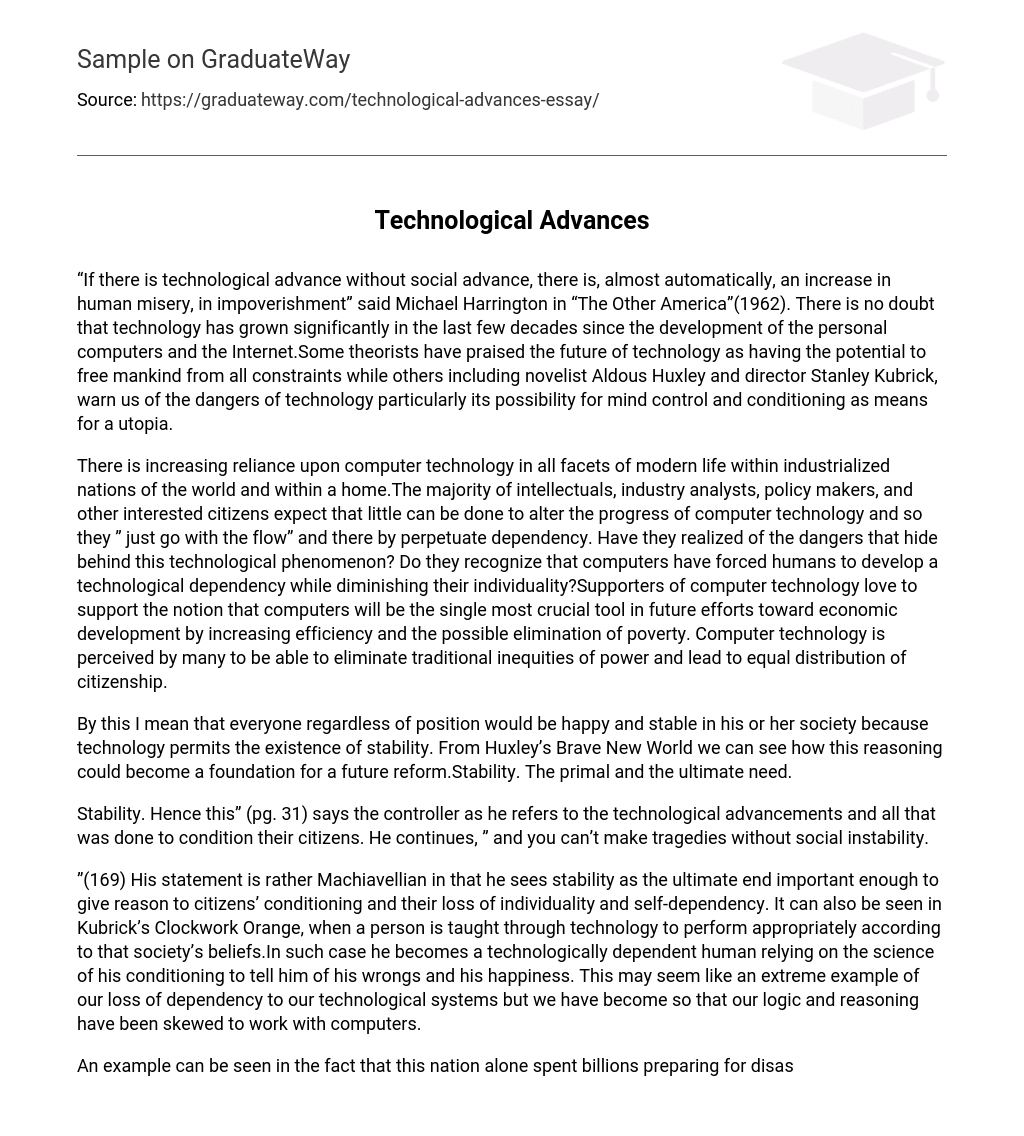In his book “The Other America” (1962), Michael Harrington warned that technological advancement without social progress can result in increased human suffering and poverty. In recent years, technology has experienced substantial growth with the introduction of personal computers and the Internet. Some theorists praise technology for its ability to free humanity from limitations. Nevertheless, novelist Aldous Huxley and director Stanley Kubrick have also cautioned against the dangers of technology, specifically its potential for mind control and conditioning that could be exploited to establish a utopian society.
In modern industrialized nations, there is a growing reliance on computer technology both in various aspects of daily life and within households. Many intellectuals, industry analysts, policy makers, and concerned individuals accept that the progress of computer technology cannot be altered and therefore embrace it, perpetuating dependency without fully recognizing the dangers it poses. Are they aware of the hidden risks posed by this technological phenomenon? Do they acknowledge that computers have compelled humans to become dependent on technology while diminishing their individuality? Supporters of computer technology often champion the idea that computers will be a crucial tool in future economic development, enhancing efficiency and potentially eliminating poverty. Many perceive computer technology as capable of resolving power imbalances and promoting equal distribution of citizenship.
Technology enables stability in society, which means that everyone, regardless of position, can be happy and stable. Huxley’s Brave New World demonstrates how this idea could be the basis for future reforms.
According to the controller, stability is of utmost importance, as mentioned on page 31. He refers to the technological progress and other measures taken to control the citizens. He further argues that without social instability, tragedies cannot occur.
“(169) His statement is rather Machiavellian in that he sees stability as the ultimate end important enough to give reason to citizens’ conditioning and their loss of individuality and self-dependency. It can also be seen in Kubrick’s Clockwork Orange, when a person is taught through technology to perform appropriately according to that society’s beliefs.In such case he becomes a technologically dependent human relying on the science of his conditioning to tell him of his wrongs and his happiness. This may seem like an extreme example of our loss of dependency to our technological systems but we have become so that our logic and reasoning have been skewed to work with computers.
This nation alone spent billions preparing for disaster that may arise from how computers store dates, demonstrating the extent of technological dependency. While technological advancements bring potential benefits for the future, they also come with drawbacks. How far is mankind willing to go to achieve stability and worldwide happiness? Today, as technological transformations continue in an increasingly complex and rapidly advancing environment, concerns arise about the downsides of our “wonderful” technological age. These include reduced right to privacy, increased techno-crimes, system incompatibility, unnecessary complexity, planned obsolescence of hardware, and heightened interdependence between users and technology. Our privacy, a highly valued aspect, is threatened as computers expand. System incompatibility, complexity, and planned obsolescence hamper complete interaction between various systems.
As our reliance on computers to simplify our work increases, we become more interconnected with their functions and depend on them to organize our lives. While there are numerous potential concerns associated with this, none are as crucial as the human consequences resulting from technological advancements. However, if we disregard the social and political impact of technology, our only hope is to enhance productivity and meet basic social needs, which ultimately leads to a weakening of community bonds, detachment from nature, a sense of purposelessness, and greater inequality.
By individual purposelessness, I am referring to individuals who work in square cubicles in front of a computer. Scientifically, it has been proven that this environment diminishes a person’s individuality, making them feel insignificant and dispensable. The cubicle system mirrors the mechanics of a computer, where various commands are combined to achieve a common goal, treating humans as mere cells. It is ironic that we become components within the very system that strips away our individuality. Consequently, it is natural for individuals to feel purposeless under these circumstances.
Contemporary technologies indirectly contribute to various social problems and subtly impede our free will by imposing dependency on us. For instance, Kubrick’s film presents a connection between technology and the loss of freedom. In one scene, the chaplain realizes that due to experiments, the boy has completely lost control of his human nature and has been forced to function like a robot.
When our computers crash or become unusable, we often have to buy a new device or upgrade. This results in losing our personal will, desires, and goals due to technological advancements. Our satisfaction relies on getting what we want and not wanting what is impossible to get.
They are perpetually in good health and have no apprehension of mortality.
The people in the text are so conditioned that they are practically unable to behave as they should (169). Individuality, as well as desire and our human nature, have been lost. Their conditioning has taken away their basic human needs. The fear of death, sickness, and desire are valuable because they assist in our growth and aid us in comprehending some of life’s meanings. Are these individuals truly content? They have been conditioned to feel happiness, but unfortunately, they cannot truly be happy. They cannot experience any spontaneous bursts of brilliance. Stripped of their individuality and purposefulness, they are gradually becoming more like computers and less like humans.
Thankfully, there are potential approaches and plans that can support both essential economic and social requirements, as well as preserve democratic community, civic engagement, and social justice. Thus, the goal is not to completely disregard all technology, but rather to be more selective in the way we create, select, and employ technologies.





